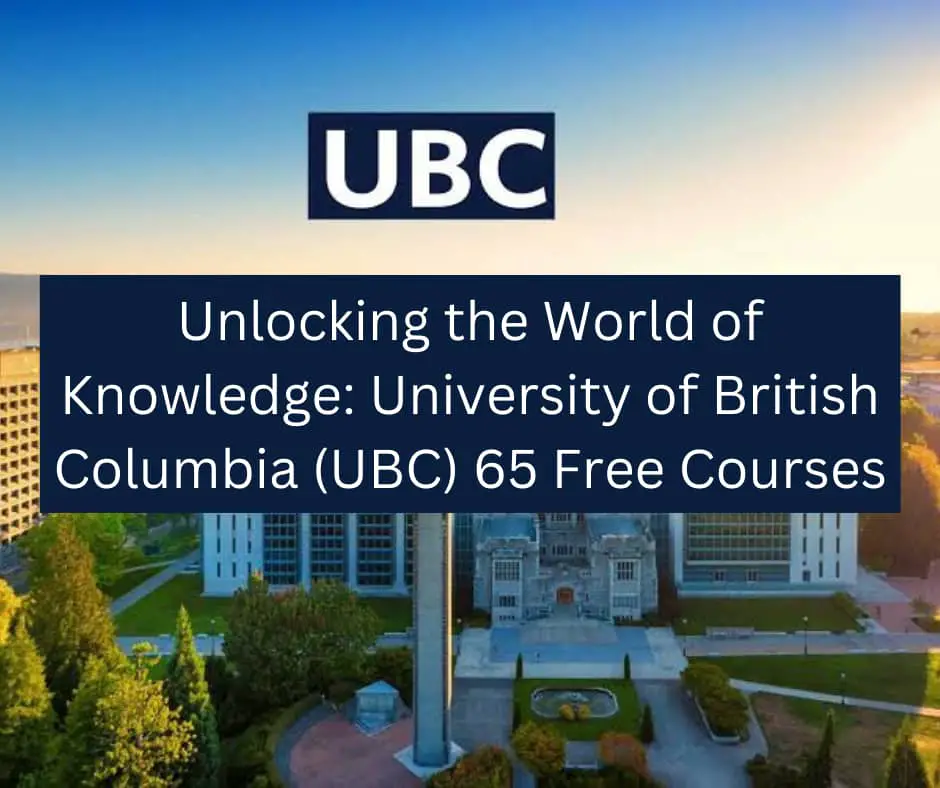Are you passionate about expanding your knowledge and developing new skills? Look no further than the University of British Columbia’s (UBC) free courses. With their commitment to accessibility and education, UBC offers a diverse range of courses that cater to a wide range of interests and disciplines. Whether you are interested in the humanities, sciences, arts, or business, UBC’s free courses provide an incredible opportunity to pursue lifelong learning without financial constraints.
In an era where lifelong learning is paramount, the availability of free courses has become a game-changer for individuals seeking personal and professional development. University of British Columbia (UBC) stands out as a leading institution that has embraced this paradigm shift by offering a wide range of free courses. This article aims to shed light on the invaluable opportunities provided by UBC’s free courses, highlighting their benefits, subjects, and the transformative impact they have on learners.
Also Check Out Our Guide on Transforming Your Scholarship Essays with Grammarly: A Step-by-Step Guide
List of Free University of British Columbia Online Courses
Below is the list of all available free online courses at The University of British Columbia
- Excel for Everyone: Core Foundations
- How to Code: Simple Data
- Introduction to Marketing
- Excel for Everyone: Data Management
- Business Foundations
- Excel for Everyone: Data Analysis Fundamentals
- Business Communications
- AP® Psychology – Course 1: What is Psychology?
- Strategies for Online Teaching and Learning
- How to Code: Complex Data
- Ecodesign for Cities and Suburbs
- Online Course Development: Planning and Implementation
- Video Game Writing Essentials
- Designing and Developing an Online Course
- AP® Psychology – Course 2: How the Brain Works
- AP® Psychology – Course 4: How Behavior Works
- Worldbuilding for Video Games
- Software Construction: Object-Oriented Design
- AP® Psychology – Course 3: How the Mind Works
- Writing Video Game Characters
- AP® Psychology – Course 5: Health and Behavior
- Software Construction: Data Abstraction
- Putting The Arts in STEM Education
- Writing Video Game Scenes and Dialogue
- Biospecimen Research Methods
- Introduction: Emerging Technologies in an Enterprise Environment
- AI for Teachers
- Interactive Narrative
- Policy Analysis Using Interrupted Time Series
- Human-Centered Design for Work at a Distance: Toolbox Essentials
- AP® Psychology – Course 6: Exam Preparation & Review
- STEM & Sustainability
- Silicon Photonics Design, Fabrication and Data Analysis
- Quantum Computing for Your Classroom 10-12
- How to Write a Novel: Structure & Outline
- Human-Centered Design for Work at a Distance: Prototype Solutions
- Engineering for Your Classroom 4–9
- Reconciliation Through Indigenous Education
- Working as a Game Writer
- STEM Outside
- How to Write a Novel: Writing the Draft
- How to Write a Novel: Edit & Revise
- Software Engineering: Introduction
- AP® Psychology – Course 0: Introduction
- Gender and Sexuality: Applications in Society
- Software Development Capstone Project
- The Science of Religion
- Coding for Your Classroom 4 – 10
- Climate Change: The Science
- Chinese Thought: Ancient Wisdom Meets Modern Science – Part 1
- Coding for Your Classroom K – 3
- COVID-19 & Society: Inequality in Global Pandemics
- Urban Water – Innovations for Environmental Sustainability
- Implementation Strategies: AI and Cognitive Computing
- Safe Surgical Care: Strategies During a Pandemic
- Re-Imagine Work: Strategies During COVID-19 and Beyond
- Chinese Thought: Ancient Wisdom Meets Modern Science – Part 2
- EQ for Family Business
- Audio Production for Virtual Media Creators: Advanced Loop Creation and Underscoring
- Audio Production for Virtual Media Creators: Signal Flow & Introduction to Looping
- Implementation Strategies: Cloud Computing
- Engineering for Your Classroom K – 3
- Useful Genetics, Part 2: Genes and Genetic Inheritance
- Useful Genetics Part 1: How Our Genes Shape Us
- Introduction to Corporate Finance
Benefit of The University of British Columbia University
We will explore the compelling benefits of The University of British Columbia University’s free courses, shedding light on how they empower individuals and unlock exciting opportunities for growth. Whether you are a lifelong learner or a professional looking to enhance your skills, UBC’s free courses offer a pathway to knowledge and transformation.
💬 Get Paid in Dollars Just by Chatting With Lonely People
Imagine earning daily dollar income from anywhere in the world — no degree, no experience, no interviews — just your phone or laptop.
People are getting paid simply to chat, listen, and keep others company online. This short ebook reveals:
- ✔ Legit platforms that pay in USD
- ✔ How Africans can register & withdraw successfully
- ✔ What to say to keep conversations paid
- ✔ How beginners start with zero experience
Instant download • Works worldwide • Beginner-friendly
- Breaking Barriers with Accessibility: The University of British Columbia’s commitment to providing free courses is rooted in its mission to make education accessible to all. By removing financial barriers, the university ensures that knowledge is not confined to those who can afford it. This inclusivity promotes diversity, empowers individuals from diverse backgrounds, and encourages a lifelong passion for learning.
- Diverse Subject Areas: The UCB’s free courses span a diverse range of subject areas, catering to a wide spectrum of interests. Whether you’re interested in expanding your knowledge in the humanities, sciences, arts, or business, UCB offers a wealth of options. From introductory courses to more advanced modules, learners have the opportunity to explore subjects that intrigue them, fostering intellectual curiosity and personal growth.
- Professional Development: One of the significant advantages of the University of British Columbia’s free courses is their relevance to professional development. In today’s competitive job market, having additional skills and knowledge can be a differentiating factor. The University of British Columbia’s courses provide learners with the chance to acquire industry-specific expertise, enhance their resumes, and stand out in their careers. From project management to data analysis, these courses empower individuals to gain valuable skills without the financial burden of traditional education.
- Blending Technology and Education: The University of British Columbia has also successfully integrated technology into its free course offerings, leveraging online platforms and interactive tools to enhance the learning experience. Learners can access course materials, engage with instructors, and collaborate with peers through virtual classrooms. This flexible approach allows individuals to learn at their own pace, from any location, expanding the reach of education beyond geographical constraints.
- Networking and Community Building: Enrolling in a UCB free course not only grants access to valuable knowledge but also opens doors to a vibrant community of learners. Discussion forums, online meet-ups, and networking events enable participants to connect with like-minded individuals, fostering meaningful relationships and professional collaborations. The BCU community is a supportive and engaging environment that encourages learners to exchange ideas, share experiences, and grow together.
Bottom Line
The benefits of these courses extend far beyond the acquisition of knowledge. They offer the chance to gain industry-relevant skills, enhancing career prospects and opening doors to new professional opportunities. By embracing technology, UBC’s free courses make learning accessible anytime, anywhere, bridging geographical boundaries and accommodating busy lifestyles.
Moreover, the UBC community created through these courses fosters connections and collaboration. Engaging with like-minded individuals, sharing experiences, and exchanging ideas enriches the learning journey, creating a supportive network of lifelong learners.
As this article comes to a close, we invite you to seize the opportunity to embark on an extraordinary educational adventure with UBC’s free online courses. Embrace the power of knowledge, cultivate personal growth, and unlock a world of possibilities. The University of British Columbia awaits, ready to guide you on your path to lifelong learning and success.
Visit The Official Site for More Information on The University of British Columbia Free Online Courses
🔥 Want to Make Money Online the Right Way?
Discover how smart people are quietly earning with AI, Email Marketing, CPA, LinkedIn, Online Teaching & Content Creation.
This is not theory — it’s a step-by-step system.
👉 Get the Ebook Now
